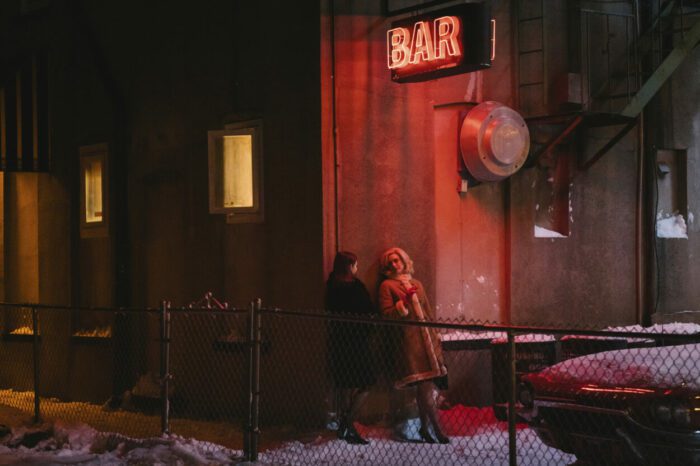Eileen is an exercise in contrasts, expectations, and character. Director William Oldroyd (Lady Macbeth) adapts Otessa Moshfegh’s novel with a script by Moshfegh and Luke Goebel, turning the novel into a wonderfully visual work of character and tension building. What results is a wonderfully surprising, engaging, and beautiful film that accomplishes a lot with a little.
Thomasin Mackenzie stars as the titular character, a secretary at a local boys’ prison somewhere in 1960s Massachusetts. She is an eminently unhappy young woman, getting by with her job and living with her abusive father (Shea Wigham), seemingly aspiring to nothing more. The story of the film begins with the arrival of Dr. Rebecca St. John (Anne Hathaway), the new prison psychologist, who takes a fascination with the case of a local boy recently arrested, and an interest in Eileen as well.
Mackenzie is a great talent, and she has been seemingly typecast into roles like this, that is, quiet but troubled young women. It is a testament to her talent, then, that Eileen as a character does not feel like a complete retread of characters she’s done before this. There’s so much of Eileen’s character that is shown without words, and Mackenzie is able to effectively sell it well. Her childish smile in particular carries a lot of weight in the film, and it is a key part of her performance. She embodies Eileen’s conflicts, her repressed feelings, and her coming-of-age in remarkable fashion.
Hathaway’s character, meanwhile, feels otherworldly in just how different she is from everyone else, and how she shakes up the film’s world. Everything about her, from her hair to the way she dresses to the way she speaks, stands out. Hathaway is perfect for a role like this, and she is electric. Her performance lends so much weight to the character, not just during her presence but also her absence, both of which are felt in powerful ways over the course of the film. She feels strangely like Marilyn Monroe; strange because of how random it feels that she evokes such an image, but also because of how close her performance hues to Monroe’s image in popular culture, with a tragic, ghostly complexity to her.
Eileen‘s setting of a nondescript Massachusetts town in the dead of winter lends it a potent lonely nature. Oldroyd and cinematographer Ari Wagner shoot the Massachusetts winter with the required darkness, and make use of dramatic reds and oranges. Oppressive grey and blue overcast in the daytime works similarly to provide a haunting, surreal atmosphere.

Indeed, one of the many remarkable things about Eileen is how it dwells in Eileen’s own mind and imagination. Rebecca being so otherworldly is an element of this, but we’re further privy to what Eileen is thinking. Eileen frequently imagines herself acting on her intrusive thoughts, often for shock value, as when she has sexual fantasies at work, or for gallows humor, as when she imagines shooting her father in the back of the head after he drunkenly berates her, a scene that is, I promise, funnier than it sounds. These images get quite dark—Eileen, for instance, frequently dreams of suicide—but they’re instrumental in putting the audience inside Eileen’s head.
The film’s plot meanders without real direction for much of the film, but at about one hundred minutes, it does not necessarily drag. It burns slow, but it also seems to be deliberately playing with expectation for much of its runtime. It might be a slight spoiler to say, but Eileen is not necessarily a romance. The film is very much concerned with romance, and Eileen’s own feelings of love, lust, and connection, but the film is like a foil to its own setup. It is very easy to see the comparisons to something like Todd Haynes’s Carol, but the film escapes that easily in its runtime.
In fact, much of the film’s movement stems from Rebecca’s occupation with the case of a young boy named Lee Polk who killed his own father. This factors in to the film in unexpected ways, acting as a backdrop until it very much is not. It is interesting to consider this element of Eileen as a contrast to Eileen herself. The boy took on his own father, killing him, while Eileen herself mostly submits to her own abusive father.
One also might consider the in terms of Rebecca’s perspective, which the film only allows the audience to guess at, which makes it all the more engaging. The Polk case is Rebecca’s fascination, while Rebecca herself is Eileen’s fascination, and Eileen is maybe too naive or deluded to really understand if Rebecca is so taken aback with her or with the case. The audience might be this deluded, too, and we’re left knowing ultimately very little. This is part of what makes Eileen so fascinating, though, and allows it to suggest nearly as much as it does with what the viewer does not see as with what they do.
Ultimately, Eileen is remarkable for what it is able to accomplish as such a small film. It accomplishes so much of its character work visually, and its surrealism is deftly paired with the harsh realities that Eileen faces. Also impressive is how much the film accomplishes with what it does not show. At times it may be guilty of creating shocking or surprising images just to break up tension, but in the end Eileen is a charming work with a beautiful sense of place and two wonderful performances. In the cold and bitterness that it revels in, furthermore, Eileen left me with a cautious warmth. People and opportunities arrive in our lives unexpectedly, and will often leave us not with what we wanted, but with perhaps something we desperately needed.



